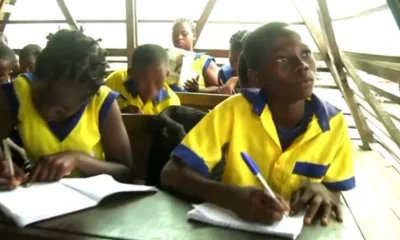News
Over 20m Children Out-Of-School, Poverty Rate, Insecurity Worsen

By Oladosu Oluwagbenga
Over 20m Children Out-Of-School, Poverty Rate, Insecurity Worsen – Despite government attempts, a large number of Nigerian youngsters are dropping out of school. The latest information from the United Nations Educational, Scientific and Cultural Organization, UNESCO, states that the current number of out-of-school children in Nigeria is 20 million, despite the Federal Ministry of Education finding flaws in SBMorgan Intelligence’s 2021 estimates that put the number at 12.3 million.
According to UNESCO, who claims to have used new and improved methodology to determine the most recent figures, “244 million children and youth between the ages of 6 and 18 worldwide (who) are still out of school,” with India, Nigeria, and Pakistan having the highest rates of out-of-school children globally.
The main causes of many youngsters dropping out of school include poverty, a lack of educational opportunities, insecurity, and tradition, among others.
Many minors who should be in school are frequently observed selling sachet water and other drinks in the street during school hours, as well as learning trades at mechanic shops and marketplaces. Many people are on the streets appearing disheveled, some are at bus stops prepared to take luggage from commuters, and some beg for alms while there is traffic. Others carry loads for a fee in markets.
Despite Nigeria being a party to the Convention on the Rights of the Child, which contains the stipulations of Article 28, the terrible trend continues.
According to the article, “States Parties recognize the right of the child to education and shall, in order to realize this right gradually and on the basis of equal opportunity, in particular:
Make primary education mandatory and free for everyone; promote the growth of various secondary educational programs, including general and vocational education; make these programs accessible to all children; and take appropriate action, such as instituting free education and providing financial aid in cases of need;
Over one in five children who are not in school worldwide, according to UNICEF, a United Nations organization
Only 67% of eligible children enroll in elementary education, according to the agency. There is only a small chance—roughly 25%—that a youngster who leaves school for even a brief period of time will ever return. It was also mentioned that girls experience education loss more severely than boys.
Only 41% of eligible girls in the North-East of Nigeria attend basic school. In the Northwest, the percentage is 47%. Additionally, social attitudes have a negative impact on education rates, particularly in northern Nigeria.
In the North-eastern and North-western states, respectively, 29% and 35% of Muslim pupils attend Qur’anic schools, which do not teach literacy and numeracy or other foundational subjects. The government formally deems these kids to be out of school.
Lagos Situation
According to reports, Lagos is the South-West state with the third-highest percentage of out-of-school children. 20 local government areas comprise its 1,009 public schools, of which 10 have a disproportionately high number of out-of-school children.
Experts predict that if the government enrolls six children in school today, 10 will be back on the streets tomorrow, despite the government’s vow of zero tolerance for out-of-school youngsters.
THEEAGLE conducted interviews with a few of the out-of-school kids throughout the state.
Rasheed Tijani, a 9-year-old mechanic shop trainee, claimed he had attended a public school in Ikorodu. When he was eight years old, he started to learn the trade. According to him, his parents claimed they observed that he was learning too slowly and could not afford to continue to let him waste time in school.
“I’m learning how to fix cars, but I really wanted to be in school.
“Money to transport me to school is too much because it is far from our house. I am happy here too and I know all of us will still meet up one day,” he philosophized.
When THEEAGLE contacted the kids at Orile Iganmu to inquire as to why they weren’t in class, several of the kids who were washing cars in the street fled. I don’t want to go to school,” replied one of them after a little pause and going by the name Ahmed. Give me some space. THEEAGLE approached two young girl selling cut foam in the street on Mile 12 Bridge. Because of her physical attributes, one of them, Sarah, who appeared to be 13 years old, said, “I’ll go to school, but I still want to sell and make money for my grandma.”
The second girl, also in her age group, Miriam, said: “I stopped attending school. My aunt promised that I would return to school, but my parents remain in the village, so I’m selling for her.
Nigerian Government Capable To Take Children Out Of Street – ASOHON
Alhaji Ganiyu Olayiwola Dosunmu, the Coordinator of the Lagos Chapter of the Association of Orphanages and Homes Operators in Nigeria (ASOHON), claimed that the government had the power to remove out-of-school children from the streets, provide for them, and divert their attention away from criminal activity like kidnapping and banditry to productive endeavors that would benefit all.
“Orphans outside there are more than those kept in orphanage homes. They are without parents or guardians. They only have useless teachers who put them into drinking alcohol, hard drugs, smoking etc.
‘’Unless concrete steps are taken by the government and the society to look out for orphans to provide social and emotional support to address their needs, society may be in great danger. Giving them food on the roads once a year does not solve their problem,” ASOHON said.


















